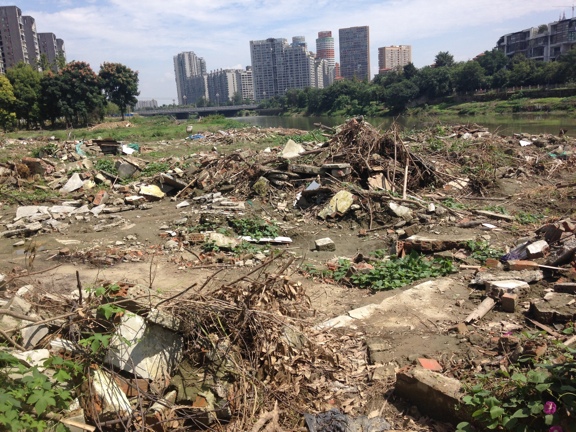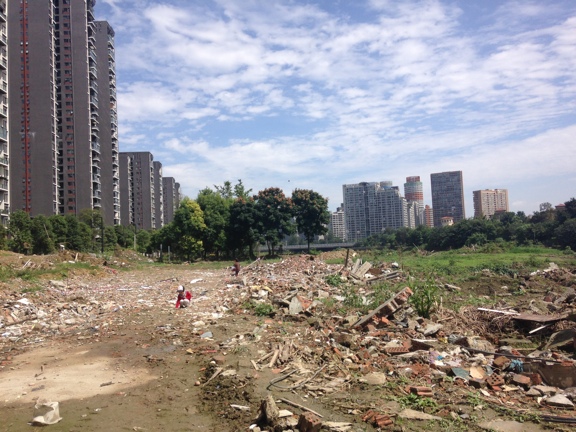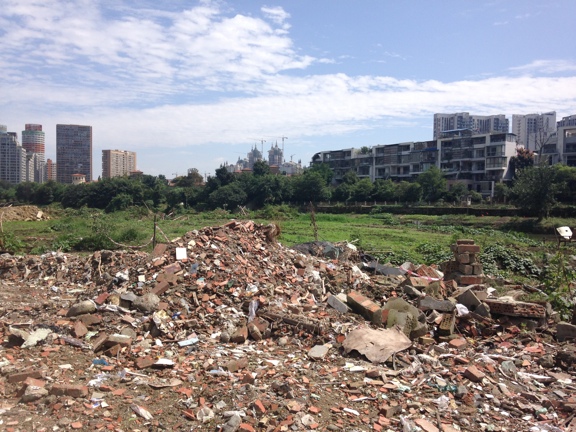I live not far from the sluggish southern end of the river that runs through Chengdu. I go down to the river maybe three or four times a month with my two sons, and we throw rocks into the sewage run off, watch the old men throw small nets at the mouth of the same run off, and run through the rubble and jungle of the wild urban riverbank.
Just after the worst of winter broke, I noticed the old folk crawling around the wreckage of some old neighborhood, smashing big slabs of concrete into smaller slabs, and preparing the earth beneath for planting season. One old man dropped a huge stone down on the concrete floor of a razed hovel, over and over again, slowly creating his third patch. I do it for fun, he said, for something to do. His son bought a house in the high rises behind him, and he can’t stand being cooped up in the house. So he brings his tea thermos and a radio blaring old opera classics down to the flotsam strewn riverside and builds gardens.
Old women bent at the waste in the sticky muddy rise between the new buildings and the brown river. Plots walled off from each other with slabs of concrete, plywood, metal bars. One shoe and a pair of perfectly good shades in a sea of shattered bricks. I took the boys down there when it was cold, then later when the sun came out and the rapeseed bloomed, throughout the hot summer, and up until September 25th, when we found the entire riverside garden community razed to the ground. It had happened a few weeks ago, by the looks of the wreckage. Little weeds were already sprouting out of the piled up remains.
I took pictures and video as an afterthought, as a small project I knew would come to this, a little essay like a struggling bulge-eyed fish in an old man’s net. I know the gardens and the old men and women tending them hold incredible meaning, but I am not sure what the meaning is, or whether or not any of them feel it was more than just a lark, a habit unbreakable. Like the old grandmother of middle class aspirants unable to keep her hand out of the garbage cans and away from the plastic bottles. I wrote this story for Next City, and I think that’s as close as I came to contextualizing Chengdu’s urban plots.
Here are some of the pictures I took, along with the time they were taken.
Early Spring 2014





Late Spring into Summer 2014





Late Summer into Fall




Do you have any little communities like this near you? Let us know in the comments.
Interesting observations Sascha and great photos. This is the kind of on the ground reporting in China I’d like to see more of.
I love the resourcefulness of the senior folk in building a garden. It reminds me of when my grandfather used to maintain a community garden with his friends on what was essentially a surface parking lot in the east L.A. suburbs.
I’m curious to know why did they reduce the planters and retaining walls to rubble after the season was over? Could’ve they kept the infrastructure they built and planted a new garden when the early spring arrived again? Or do they enjoy the act of building with the broken pieces?
They razed it because sometime in the near future – perhaps a year from now – the developer responsible for the apartment complexes nearby will landscape the riverside. That’s what I guess, but I am not sure.
It reminds the situation what happened to my hometown. Its small town in a small city in Sichuan province, we have large farmland which most of them has been wasted, most of the young people went to Guangdong or other big city, they make money then try to get one apartment in the town area, so they do not need live stay the old place which transportation or other things might not be so convenient(some people do live in the valley) , and the people who used to live in the town, they move to the local city, some people who lived in the local city then moved to big city(like Chengdu).that’s why most of the land has been wasted.
Some people who move to another place can adapt the new life easily; they can follow the new place’s people life style. Some people who can’t change easily. People who have been spent most of the lifetime on their loved farmland; they could not just give it up. They still trying to find one land and do some small farming. That’s what happened to the people who moved from the valley to the town, they been search the land that no one was using, and do the farming. When their sons back home, they will ask them to bring all the food which they harvest. When the first time my aunt visited my cousin’s girlfriend’s parents, she brought nothing but some beans she grew and the egg that hens is feeding without feed but corn.
Has been stayed in Chengdu almost 5 years, I’m seeing how Chengdu is changing. Every coin has two sides, but I’d prefer back my hometown to spend my old ugly women time when I was old. I have my own land there, have a dog, do some farming, never gonna be a bad thing. sorry for the nonsense comment, I would like to use one Chinese small sentence to end this “ 为什么我的眼里常含泪水,因为我对这片土地爱得深沉”
thank you for sharing this … a lot of young Americans are opting to head out to the countryside too. Not everyone is seduced by city life.
Money and a big city are not always good. People get trapped into the rat race trying to keep up with their neighbors. Each person must find what makes them happy. For one it may be a slave to debt example large home fine cars everything finance working every hour to pay bills. Another person maybe a small farm with a garden and close family unit they can count on. Peace of mind and good health is GOOD medicine!!! We loved china on our visit would like to go next time to smaller towns that aren’t commercialized. I enjoyed reading y’all blog. Thanks, James
You’re right, James. There are some areas on the outskirts of Chengdu that really embrace this mentality, one of those has traditionally been Sanshengxiang, which we call Flower Town. The lifestyle there is completely different from Chengdu. In fact there are still people around Chengdu who are living the small farm life that you describe, but I think their numbers are dwindling as the expansion of Chengdu inexorably continues.
Not the best city view from the apartments nearby. But that’s life. When authorities will decide to improve this area, some poor families will endure the change.
Thank you for your report on the riverside. I lived near the southern new developed area as well. Few months ago, I still see people taking their buffalos down to the river for a stroll, while the high-rises looking down onto them. Such an interesting and conflicting scenery. Too bad I don’t have the time to take a snapshot of that. The empty lands near my apartment are also planned for development, but I can still see people who haven’t moved out tacked up piles of dirt and grows. I believe agriculture, in a very personal and physical scale, is something that has been in the human culture. But while it grows into the scale of industry and mass production, the related culture and heritage and even our health (food safety issue) can be sabotaged in a very snippet of time.
Yes, China has been an agricultural nation for soooo long … and all of that has changed in a “very snippet of time” … the true beauty of this and any country is in the land.
Dear Sascha, thanks for sharing your view and stories. I am a German video producer realizing corporate videos all over the world for mostly German clients. As a lot of German companies already started a business in Chengdu, we have a lot of requests for local video crews in Chengdu. But until know I did not succeed in getting in contact with video-cameramen and local producers in Chengdu speaking English. So if you may have any contact or information that might could be useful – I would be more than happy to hearing from you. Until today we always fly video crews over from Hong Kong or Shanghai, but this is not very efficient. Thank you, best regards Christina